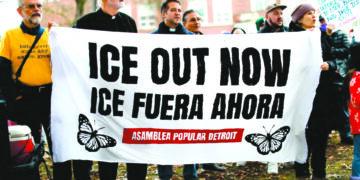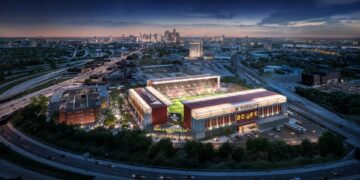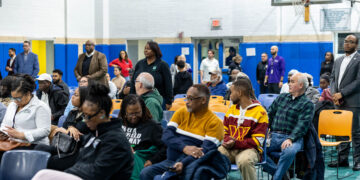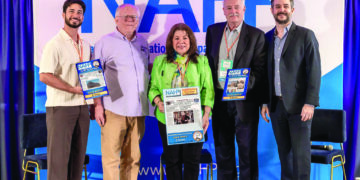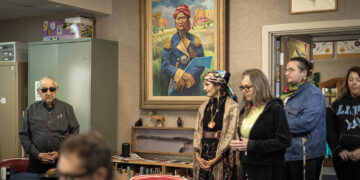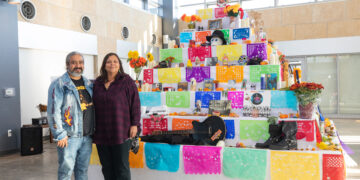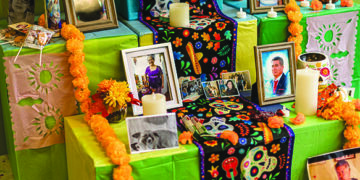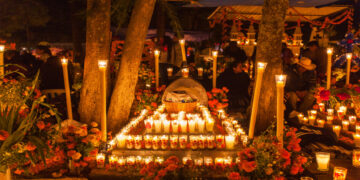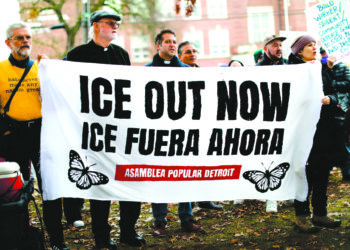The organizers of a new professional soccer stadium and housing development are in overdrive as they meet with nearby residents, community groups and business owners in advance of the spring 2027 opening.
The Detroit City Football Club is planning to move from Keyworth Stadium in Hamtramck to the new complex on Michigan Avenue near 20th Street in Detroit. The 15,000-capacity stadium will be built on the site of the shuttered Southwest Community Hospital. The $150 million project is to be privately funded, but the city is paying up to $5.9 million to raze the hospital and could give tax breaks of more than $1 million for the project.
“I am incredibly excited for this project,” Detroit City Council member Gabriela Santiago-Romero said last week at a public meeting about the project at the Mexicantown Mercado. “Let’s make this project inclusive for the city.”
A parking structure and about 70 units of housing also are part of the project
As many as 35 events could be hosted at the stadium in its inaugural season. The events would be a combination of men’s and women’s professional soccer matches as well as concerts, said team spokesman and cofounder Sean Mann.
“This is an exciting moment,” Mann said at the meeting. “This is one of the most remarkable moments in American soccer.”
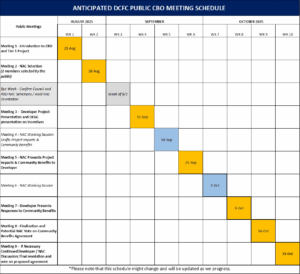
There were mixed feelings among the people who attended the meeting. All of them agreed the vacant hospital needed to be torn down. But there was some disagreement as to whether a stadium needed to be erected on the site and so close to densely-populated neighborhoods.
Mann drew applause when he said the club would be the only professional team in the city with a stadium paying property taxes. As well as for free soccer programming the club runs in Detroit for youth.
Longtime resident Bill Cheek appreciates the club’s goodwill but does not believe neighborhood concerns are given enough weight. The area he lives in was not contacted by the club, unlike thousands of other nearby residents and businesses who were reached out to, he said.
“You have a neighborhood that has been ignored and rendered invisible,” he said. “It is an insult to the neighborhood to be dismissed.”
One of Cheek’s main complaints is how parking will affect the area. Mann said the club has 2,600 parking spaces. That is 100 more than required by city regulations that call for one parking space for every six seats. He said the club is looking to purchase or lease more land for parking as the project moves forward.
Cheek said there is no way to accommodate a packed stadium without visitors taking up spots in front of the homes of residents or by blocking driveways or fire hydrants. He said the same thing happened when the Detroit Tigers played at Michigan and Trumbull. He also worries about noise from the open-air stadium.
“It is almost impossible to buffer noise from the stadium,” Cheek said.
Mann will address the North Corktown Residents Association in September to share information and take concerns under advisement. Association president Bre Williamson said the association will fully engage with Mann and other officials to make sure their concerns are heard. She appreciates that team owners live in the area and would have to deal with parking and noise issues, just like her members.
“We want to mitigate what we know will happen,” she said of noise and parking issues.
The project includes a parking structure with about 400 spots, but 76 will be reserved for residents of the proposed housing, Mann said.
Williamson said that will lead to people parking wherever they can find a spot, especially if it is free.
“People will opt to park for free and walk (several) blocks to the stadium,” she said. “We see that all the time at downtown events.”
Area businesses would like to capitalize on that foot traffic, said the Southwest Detroit Business Association’s Mexicantown Main Street director Jose Maldonado.
“We see it as a boost for the area,” Maldanodo said. “They are actively pressing for a connection with Mexicantown.”
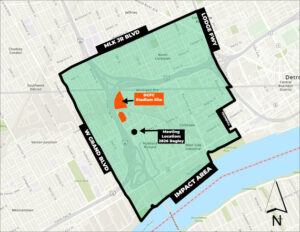
Mann was to meet with business owners this week to discuss everything from shuttles, to parking to promotional opportunities. Organizers would like to see the stadium be a link between Michigan Avenue and West Vernor businesses and other offerings. The idea is to be as inclusive as possible.
“He wants to make sure the narrative is the stadium being (built) in Southwest Detroit. Not Corktown,” Maldonado said.
Creating synergy with Mexicantown makes sense because there was a huge influx of visitors to restaurants, shops and cultural attractions when the NFL draft was held at Hart Plaza and Campus Martius last year, Maldonado said.
More than 775,000 NFL fans came to the city for the draft and related activities, setting a record for the annual event.
“We studied the numbers and there was a 70 percent increase in walking traffic (in Mexicantown) when it was the NFL draft over the same period the previous year,” Maldonado said. “That is enormous. That is a window into how sports can support our main streets.”
Sheila Cockrel, a former Detroit City Council member and a board member of the Corktown Business Association, said the project can be a financial boon for the area and be a model of how to create such a project, if done correctly.
“There has to be a viable parking plan and they have to have the funding,” she said.
Team officials and the City of Detroit are hosting a series of meetings on Thursdays at the Mercado for the next two months with each meeting focusing on a different aspect of the plans. This week, two residents from near the stadium site will be selected for an advisory board. Future meetings will focus on everything from financing to the housing portion of the project.
Santiago Esparza is a Detroit-based freelance writer. He is a native of Southwest Detroit
This article was made possible thanks to a generous grant to EL CENTRAL Hispanic News by Press Forward, the national movement to strengthen communities by reinvigorating local news. Learn more at www.pressforward.news.
Los beneficios comunitarios del Detroit City FC comienzan en Mexicantown
Los organizadores de un nuevo estadio de fútbol profesional y un complejo de viviendas están trabajando arduamente mientras se reúnen con residentes, grupos comunitarios y empresarios de la zona antes de su inauguración en la primavera de 2027.
El Detroit City Football Club planea trasladarse del Estadio Keyworth en Hamtramck al nuevo complejo en la Michigan Avenue, cerca de la Calle 20, en Detroit. El estadio, con capacidad para 15,000 personas, se construirá en el terreno del clausurado Hospital Comunitario del Suroeste. El proyecto de $150 millones será financiado con fondos privados, pero la ciudad está pagando hasta $5.9 millones para demoler el hospital y podría otorgar exenciones fiscales de más de $1 millón para el proyecto.
“Estoy increíblemente emocionada con este proyecto”, compartió la concejal de la Ciudad de Detroit, Gabriela Santiago-Romero, la semana pasada en una reunión pública sobre el proyecto en el Mexicantown Mercado y agregó: “Hagamos que este proyecto sea inclusivo para la ciudad”.
Un estacionamiento y unas 70 viviendas también forman parte del proyecto.
Se podrían celebrar hasta 35 eventos en el estadio durante su temporada inaugural. Los eventos combinarían partidos de fútbol profesional masculino y femenino, además de conciertos, según declaró el portavoz y cofundador del equipo, Sean Mann.
“Este es un momento emocionante”, declaró Mann en la reunión. “Es uno de los momentos más memorables del fútbol en Estados Unidos”.

Hubo sentimientos encontrados entre los asistentes. Todos coincidieron en que era necesario demoler el hospital vacío. Sin embargo, hubo desacuerdo sobre si era necesario construir un estadio en el mismo lugar, tan cerca de barrios densamente poblados.
Mann provocó aplausos al afirmar que el club sería el único equipo profesional de la ciudad con un estadio que pagaría impuestos sobre la propiedad. Además de la programación de fútbol gratuita que el club organiza en Detroit para jóvenes.
Bill Cheek, parte del vecindario, agradece la buena voluntad del club, pero no cree que se dé la suficiente importancia a las preocupaciones del barrio. El club no se puso en contacto con la zona donde vive, a diferencia de miles de otros residentes y negocios cercanos donde sí lo hicieron, afirmó.
“Hay un barrio que ha sido ignorado e invisibilizado”, afirmó. “Es un insulto a nuestro vecindario que lo desestimaran”.
Una de las principales quejas de Cheek es cómo afectará el estacionamiento a la zona. Mann explicó que el club cuenta con 2600 plazas de aparcamiento. Eso supone 100 más de las que exige la normativa municipal, que exige una plaza por cada seis asientos. Añadió que el club está considerando comprar o arrendar más terrenos para estacionamiento a medida que avanza el proyecto.
Cheek explicó que no hay forma de acomodar un estadio lleno sin que los visitantes ocupen lugares frente a las casas de los residentes o bloqueen las entradas o los hidrantes contra el fuego. Comentó que ocurrió lo mismo cuando los Tigres jugaron contra Michigan y Trumbull. También le preocupa el ruido del estadio al aire libre.
“Es casi imposible amortiguar el ruido de un estadio”, declaró Cheek.
Mann se dirigirá a la Asociación de Residentes de North Corktown en septiembre para compartir información y tomar en consideración sus inquietudes. La presidenta de la asociación, Bre Williamson, afirmó que la asociación colaborará plenamente con Mann y otros funcionarios para garantizar que sus inquietudes sean escuchadas. Entiende que los dueños de los equipos viven en la zona y tendrán que lidiar con problemas de estacionamiento y ruido, al igual que sus miembros.
“Queremos mitigar lo que sabemos que ocurrirá”, dijo sobre los problemas de ruido y estacionamiento.
El proyecto incluye un estacionamiento con aproximadamente 400 plazas, pero 76 estarán reservadas para los residentes de las viviendas propuestas, explicó Mann.
Williamson explicó que esto hará que la gente estacione donde pueda encontrar un lugar, especialmente si es gratuito.
“La gente optará por estacionar gratis y caminar varias cuadras hasta el estadio”, dijo. “Vemos eso constantemente en los eventos del centro”.
A los negocios de la zona les gustaría aprovechar ese tráfico peatonal, afirmó José Maldonado, director de la calle principal de Mexicantown de la Asociación de Negocios del Suroeste de Detroit.
“Lo vemos como un impulso para la zona”, dijo Maldonado. “Están presionando activamente para que se conecte con Mexicantown”.

Mann se reuniría con empresarios esta semana para hablar sobre todo, desde transporte hasta estacionamiento y oportunidades de promoción. Los organizadores desean que el estadio sea un vínculo entre los negocios y otras ofertas de Michigan Avenue y West Vernor. La idea es ser lo más inclusivo posible.
“Quiere asegurarse de que la narrativa sea que el estadio se está construyendo en el suroeste de Detroit. No en Corktown”, dijo Maldonado.
Crear sinergia con Mexicantown tiene sentido porque hubo una gran afluencia de visitantes a restaurantes, tiendas y atracciones culturales cuando se celebró el draft de la NFL en Hart Plaza y Campus Martius el año pasado, dijo Maldonado.
Más de 775,000 aficionados de la NFL vinieron a la ciudad para el draft y las actividades relacionadas, lo que estableció un récord para el evento anual.
“Estudiamos las cifras y hubo un aumento del 70% en el tráfico peatonal (en Mexicantown) cuando se celebró “El draft de la NFL en comparación con el mismo período del año anterior”, dijo Maldonado. “Eso es enorme. Esto nos da una idea de cómo el deporte puede apoyar nuestras calles.
Sheila Cockrel, exconcejal de la Ciudad de Detroit y miembro de la junta directiva de la Asociación Empresarial de Corktown, afirmó que el proyecto puede ser un impulso financiero para la zona y un modelo de cómo crear un proyecto de este tipo, si se realiza correctamente.
“Tiene que haber un plan de estacionamiento viable y deben contar con la financiación”, afirmó.
Los directivos del equipo y la ciudad de Detroit están organizando una serie de reuniones los jueves en el Mercado durante los próximos dos meses, cada una centrada en un aspecto diferente de los planes. Esta semana, se seleccionará a dos residentes de las cercanías del estadio para formar parte de la junta asesora. Las futuras reuniones se centrarán en todos los aspectos, desde la financiación hasta la parte de vivienda del proyecto.
Santiago Esparza es un escritor independiente radicado en Detroit. Es originario del suroeste de Detroit.
Este artículo fue posible gracias a una generosa subvención a EL CENTRAL Hispanic News por parte de Press Forward, el movimiento nacional para fortalecer las comunidades revitalizando las noticias locales. Obtenga más información en www.pressforward.news.

